About The Lincoln Academy
A BRIEF HISTORY OF
THE LINCOLN ACADEMY
In 1964, the State of Illinois provided one of the most spectacular and successful exhibits at the New York World’s Fair. Our Land of Lincoln Pavilion featuring Walt Disney’s audio-animatronic figure of Abraham Lincoln attracted world-wide attention. In the span of this two year “engagement” at the Fair, “Mr. Lincoln” attracted over nineteen million viewers.
As part of Illinois’ participation, on Illinois Day, August 26, 1964, the State gave a party for some its most celebrated sons and daughters. Gathered in Flushing Meadows were Robert Todd Lincoln Beckwith, the great grandson of our sixteenth President, United Nations Ambassador Adlai E. Stevenson, Benny Goodman, Cab Calloway, Mercedes McCambridge, James T. Farrell, Allan Nevins, and many others who joined the host, Governor Otto Kerner, Jr.
Read More
The gathering made a deep impression on Michael Butler, the head of the Organization for Economic Development. A suggestion for an organization to honor distinguished Illinoisans had already been made by Robert E. Clarke, who was active in public relations work for the Butler Company. The Illinois Chief Executive wrote to Butler on August 4, 1964, formally putting the plan in motion, but with one important qualification:
“Each week during my term of office as Governor of Illinois, I become increasingly aware of the excellent and outstanding work being done by our citizens in a wide range of areas in business and industry, in the arts and sciences, culturally and technically. While these contributions take various forms, they all have as common denominators social, scientific, and cultural advancement. I deeply feel that these achievements should be recognized as just due, as added incentive for future achievement, and to let all citizens know and take pride in what good work is being done in Illinois.
“In giving this program considerable thought . . . I feel the Governor’s office can take limited organizational action to set it in motion. It would be unfair to the premise of such an undertaking should any political connotation surround the program. It should be a non-political and continuing annual series of awards made to individuals in Illinois. . . .”
Butler set out at once to investigate other organizations which performed functions such as those the Governor envisioned, particularly the French Academy and the Nobel laureate organization. He consulted with others and a more detailed proposal was submitted to Kerner, who commented, “I don’t think this should be run as a political thing. I love the idea, but let’s wait. If I am re-elected, let’s do it.” So as Butler said, “It was put on ice. It was not to be used as a political device.” After Kerner’s re-election, one of the first things he did was tell Michael Butler to go ahead with the plan. Butler and others went further into research of how other organizations operated and he started to set up the structure which became The Lincoln Academy of Illinois. On December 2, 1964 Governor Kerner asked Michael Butler to accept the appointment as the first chancellor of The Lincoln Academy of Illinois.
Chancellor Butler enlisted the services of several individuals who were to become members of the first Board of Regents of The Lincoln Academy of Illinois. One of their first tasks was to write the by-laws for the honor society. The members of this group, in addition to the Chancellor, were Milburn P. Akers, editor, Chicago Sun-Times; Donald R. Bonniwell, president, Bonniwell & Company;
Fairfax M. Cone, chairman, Foote, Cone & Belding; Edward Park Doyle, publisher, Chicago American; Patrick H. Hoy, vice president, General Dynamics Corporation; Paul L. McKay, president, Millikin University; William Nault, vice-president, Field Enterprises Educational Corporation; Ralph G. Newman, chairman, Illinois Commission, New York World’s Fair and Alfred Shaw, senior partner, Shaw, Metz & Associates, architects. The bylaws provided for five classes of members: Regents, General Trustees, Academic Trustees, Rectors, and Laureates. The affairs of the Academy were to be managed by the Regents who were to be elected by the General Trustees. The Academic Trustees were to be the chief executive officers of each Illinois university or college. The Rectors, initially appointed by the Governor, would be elected by the Trustees in the future. It would be their duty to submit to the Regents and Trustees the names of all individuals nominated for consideration as Laureates of The Lincoln Academy of Illinois. The Laureates were to be the honorees of the Academy and would receive the “Order of Lincoln” from the Governor at the annual convocation.
The Governor of Illinois would be the president of The Lincoln Academy. The Regents were to elect the officers of the Academy: the principal executive officer, to be known as the Chancellor; a secretary, known as the Registrar; a treasurer, known as the Bursar; and a chairman of the Board of Regents. The president and chancellor were to be Regents ex officio together with the living former governors of the State.
Chancellor Butler was mainly responsible for the medal of the Academy, “The Order of Lincoln.” The design was based on that of the French Legion of Honor. The colors came from the State symbols: red for the State bird, the cardinal; violet for the State flower; and green for the leaves of the State tree, the oak. The motto, “Palmam Qui Meruit, Ferat” (“Let him who merits bear the palm”) is based on that of Horatio Viscount Nelson and was selected by one of the Regents.
At a special meeting of the Board of Regents, held on January 26, 1965, the by-laws drafted by the organizing Board of Directors were officially adopted. The following officers were elected: Chancellor, Michael Butler; Registrar, William Nault; and Bursar, Donald R. Bonniwell.
The first convocation and installation of members of The Lincoln Academy of Illinois was held on Thursday evening, February 12, 1965, at The Chicago Historical Society. The Governor’s Reception and The Lincoln Ball took place in The Casino Club immediately following the Convocation. Formal dress (white tie or dress military uniform for gentlemen) was suggested.
Chancellor Butler called the Convocation to order. In his opening remarks he said:
“We are convened tonight to recognize the singular achievements of some of the individuals who are responsible for the Renaissance of this State. Remember, it is not the State, it is the people of any State who make or break the future. Those members of the Academy elected and decorated tonight deserve any and all of the praise that we can give them for their contributions to us. We are thus recognizing this debt and expressing our appreciation. They are the reasons we say of Illinois that today we are not in any backwater of history, but on top of the tide and we are moving with a sweep that is irresistible. The great days are not gone. The great days are here, and greater days are coming.”
Roger L. Stevens, Special Assistant to the President for the Arts and later the chairman of the Kennedy Center for the Performing Arts was the main speaker. He emphasized the importance of leadership. “In this era of unsolved world conditions, changing by the hour, leadership, which is being emphasized tonight, becomes more important than it ever has in the history of our country. I salute the new members of The Lincoln Academy for their contributions to the State of Illinois, as well as to our country. . . .”
The charming and beautiful Elizabeth (Mrs. Walter) Paepcke and the poised and popular Norman Ross introduced those individuals who were to receive the Order of Lincoln. They were each presented, alternately, by Mrs. Paepcke and Mr. Ross. The first Laureates of The Lincoln Academy of Illinois were: John Bardeen, scientist and one of the developers of the transistor; Joseph Leopold Block, leader in commerce and industry; John Stephen Boyle, Chief Judge of the Cook County Court; Richard Gibbs Browne, Executive Director, Illinois Board of Higher Education; Avery Brundage, guiding spirit of the Olympic Games; James E. Day, president, Midwest Stock Exchange; Rudolph Ganz, composer, conductor, pianist, and music teacher; William Henry Mauldin, artist, Pulitzer Prize cartoonist, creator of undying World War II characters; His Eminence Albert Cardinal Meyer, Catholic Archbishop of Chicago; Nathan Mortimer Newmark, technical genius, pioneer in the world of computers; William Allan Patterson, president, United Air Lines; Ward Louis Quaal, president, WGN Continental Broadcasting Company; Adlai Ewing Stevenson, former Governor of Illinois and the United States Ambassador to the United Nations.
After presenting the medals to the Laureates, Governor Kerner spoke. He thanked the Chancellor and the Boards of Regents, Trustees, and Rectors for their work in making the convocation a successful reality. He then concluded by saying:
“I hope that this evening is merely a forerunner of something that will be accepted beyond the borders of the State of Illinois as a means of recognizing quality, excellence, and service to people. Recognition that in some instances might have been overlooked or not adequately expressed. Too frequently we are given to the sending of floral pieces instead of letting people know in their lifetimes how appreciative we are of their works….We have a great State. We have wonderful people. Thank you for being here.”
The invocation was given by Rabbi Benzion Kaganoff, the benediction by The Venerable J. Ralph Deppen. The convocation concluded, the Laureates, Officers, Regents, Trustees, Rectors, and guests then moved to The Casino Club for the Governor’s Reception and The Lincoln Ball. Mary (Mrs. Charles H., Jr.) Sethness, was the chairman of the Ball committee. It was the first of many gala affairs during the next two decades.
In the twenty years of its existence, one hundred and twenty-six individuals have been elected Laureates of The Lincoln Academy of Illinois and have received the Order of Lincoln. Included among the distinguished sons and daughters of Illinois have been a President of the United States, several cabinet members, governors of Illinois, members of both Houses of Congress, Nobel and Pulitzer Prize winners, leaders in all of the branches of the arts, scientists, physicians, lawyers, jurists, government officials, financiers, industrialists and masters of the many fields of communication.
The Lincoln Academy of Illinois has in its first two decades performed its important role under the guidance of five governors: Otto Kerner, Jr., Samuel H. Shapiro, Richard B. Ogilvie, Daniel Walker, and James R. Thompson; and six chancellors: Michael Butler, Robert G. Bone, William K. Alderfer, Thomas R. Mulroy, Marshall L. Burman, and John T. Trutter. Each governor and chancellor has made an imprint on the Academy’s history by his personality, dedication to the position, and magnificent enthusiasm. Governor Thompson has served as president of the Academy longer than any of his predecessors. He has also served as governor longer than any of his predecessors since statehood was attained in 1818. He has never missed a Lincoln Academy convocation and his remarks on each occasion have been memorable. Former Governor William G. Stratton, who served in office prior to the inception of the Academy, has been highly supportive of the group.
The convocations of the Academy have been held in almost every area of the State, with Springfield being the host city every three or four years. The Academy has assembled in Carbondale, Champaign, Chicago, Edwardsville, Evanston, Lincoln, Moline, and Peoria. Where it has been possible, the local institution of higher education has been active in the planning and the presentation of the ceremony. The Academy has thus been able to benefit by the generous services and gracious hospitality of Lincoln College, Northwestern University, Sangamon State University, Southern Illinois University at both Carbondale and Edwardsville and the University of Illinois.
In 1975, at the suggestion of, and with the generous support of Geraldine (Mrs. J. Dennis) Freund, the Lincoln Academy began its Student Laureate Award Program. Each year an outstanding senior from each of the four-year, degree-granting institutions of higher learning in Illinois is awarded a Medallion of Lincoln and thereby becomes a Student Laureate. Student Laureates are chosen by the chief executive officers of their respective institutions, who also serve as Academic Trustees of The Lincoln Academy of Illinois. Student Laureates are honored for their overall excellence in curricular and extracurricular activities. The ceremony is held in the Chamber of the Illinois House of Representatives and is followed by luncheon with the Governor at the Executive Mansion.
In 1981 the Lincoln Academy acquired the services of a salaried executive director, Mrs. Judith H. Bartholf, who has served meritoriously as a Regent of the Academy. The organization has issued occasional publications and has begun publishing the proceedings of the annual convocations for general distribution.
The first twenty years of The Lincoln Academy of Illinois have occurred in a period of great world achievement and change. Man has gone to the moon; an Illinois-born president has been elected and re-elected; another president has resigned; a woman is the prime minister of Great Britain; the giant American Telephone and Telegraph Company has been dismantled, and Coca-Cola has changed its formula. Men and women have sought and achieved excellence in the arts, sciences, technology, education, business, and government. Nobel and Pulitzer prizes, and other honors, have been awarded to Illinoisans. The sons and daughters of the Twenty-first State have made their imprint on history, and in the main, have helped to make this a better world for their own and future generations.
We are proud of Illinois and those whose lives and achievements are associated with it. We are privileged to be able to recognize their accomplishments and hope the words of our great namesake expresses their own feelings when they are awarded The Order of Lincoln:
“Every man is said to have his peculiar ambition. Whether it be true or not, I can say for one that I have no other so great as that of being truly esteemed of my fellow-men by rendering myself worthy of their esteem.”
So said Abraham Lincoln and so states The Lincoln Academy of Illinois.
Ralph G. Newman
A History Update | May 2, 2014
The Lincoln Academy of Illinois
A HISTORY UPDATE
May 2, 2014
A founding Regent of the Academy and, later, a Lincoln Laureate, Ralph G. Newman wrote the foregoing history on the occasion of the Lincoln Academy’s 20th anniversary. Since then, the Academy has continued to pursue its mission to recognize Illinoisans whose achievements have brought honor to our state and to our great namesake, Abraham Lincoln. Some 308 individuals have been elected Laureates of The Lincoln Academy of Illinois and received the Order of Lincoln, including a president of the United States, cabinet members, Nobel and Pulitzer Prize winners, great athletes, jurists, scientists, industrialists, and leaders in the arts, religion and the fields of social service and communication.
The Trustees of the Lincoln Academy have continued to be state leaders representing all geographic areas of Illinois. After the governorship of James R. Thompson, the Academy has been guided by Governors Jim Edgar, George H. Ryan, Rod R. Blagojevich, and Pat Quinn. Since the Chancellorship of John Trutter, the Academy has been led by Chancellors John Simon and Tom Johnson whose dedication and vision have strengthened the organization. Upon the retirement of Judith H. Bartholf, Julie Kellner, a Trustee of the Academy, assumed the responsibilities of Executive Director.
The Lincoln Academy’s Student Laureate Award Program continues to be held each fall in the Hall of Representatives in the Old State Capitol. The thirty-ninth annual Student Laureate Convocation took place there on November 2, 2013. In addition to the Lincoln medallion, student laureates now receive a $1000 monetary award.
In 2009, The Lincoln Academy observed the 200th anniversary of the birth of Abraham Lincoln by hosting the Lincoln Academy Bicentennial Convocation in the Abraham Lincoln Presidential Museum in Springfield and by recognizing 29 individuals whose works as scholars, collectors, artists, researchers, and civic leaders have preserved and enhanced the memory of Abraham Lincoln.
Today the work and mission of the Lincoln Academy is much more visible to the public. An informative website (www.thelincolnacademyofillinois.org) has been developed making the activities of the Academy and the accomplishments of the Illinoisans it honors known throughout the world. Each year an hour long television program covering that year’s Convocation and Investiture Ceremony is produced by WSIU Public Television and broadcast throughout Illinois. The program includes in-depth features that profile the lives and achievements of each laureate honored that year.
The Lincoln Academy of Illinois celebrated its 20th anniversary on September 14, 1985 at The Casino in Chicago. Speakers included Michael Butler, William H. Mauldin, and The Honorable James R. Thompson. The 25th anniversary party was held on September 10, 1989 at the Mid-America Club, Chicago with speakers The Honorable James R. Thompson and Hugh Downs. On September 11, 1994 the Academy celebrated its 30th anniversary at the Mid-America Club in Chicago. The Honorable Jim Edgar and Celeste Holm spoke. The Academy celebrated its 40th anniversary on September 19, 2004 at The Standard Club. Speakers were Chancellor John B. Simon and William H. Kurtis.
Tonight we celebrate the 50th anniversary of the founding of the Lincoln Academy of Illinois by gathering at The Casino in Chicago, the site where that initial Board of Regents and members, Governor Otto Kerner, Jr., and the first class of Lincoln Laureates assembled on February 11, l965 for the Governor’s Reception and the Lincoln Ball. Tonight we hear the reminiscences of the Lincoln Academy’s longest serving and most devoted President, the Honorable James R. Thompson. In doing so, we recognize those members of the Lincoln Academy of Illinois who preceded us and we renew our commitment to honor President Abraham Lincoln, our greatest President, an Illinoisan, by honoring individuals whose contributions to the betterment of mankind have been accomplished in or on behalf of the State of Illinois. We will do so tomorrow at the 50th annual Lincoln Academy Convocation which will take place at the Field Museum and where the Order of Lincoln will be awarded to John A. Canning, Jr., the Honorable Hillary Rodham Clinton, the Honorable Richard Michael Daley, the Honorable Thomas R. Fitzgerald, Michael Krzyzewski, Bernard Rands, Augusta Read Thomas, and Glenn F. Tilton.
Gayl Pyatt
Inaugural 1964 | Board of Regents
The Honorable Otto Kerner, Jr., Governor of Illinois – President
Michael Butler – Chancellor
Milburn P. Akers
Donald R. Bonniwell
Fairfax M. Cone
Edward Park Doyle
Patrick H. Hoy
Paul L. McKay
William Nault
Ralph G. Newman
Alfred Shaw
Inaugural 1964 | Trustees
Paul McClelland Angle
Lester Armour
Crowdus Baker
Bowen Blair
Mrs. Leigh Block
Rt. Reverend Gerald Francis Burrill
Paul Butler
Robert A. Clarke
Walter Cummings, Jr.
Hugo Dalmar, Jr.
John D. deButts
Gaylord Donnelley
Dr. Morris Fishbein
Mrs. C. Larkin Flanagan
Homer Hargrave, Jr.
Daggett Harvey
James C. Hemphill
Bailey K. Howard
John H. Johnson
Theodore A. Jones
Rabbi Benzion Kaganoff
Ambassador James S. Kemper
John A. Kennedy
Virgil Martin
John Maxon
William L. McFetridge
Allan McNab
Albert Cardinal Meyer
Maurice B. Mitchell
Richard H. Needham
Carver Nixon
Mrs. Walter Paepcke
The Honorable James Benton Parsons
William Wood-Prince
Clarence Randall
Norman Ross
Franklin B. Schmick
Mrs. Charles Sethness, Jr.
Sargent Shriver
Ross D. Siragusa
E. Staley, Jr.
Adlai Stevenson, III
Russ Stewart
George Swift
W. Van Gorkom
Frederick Wacker
OUR STATEMENT OF PURPOSE AT
THE LINCOLN ACADEMY
To honor individuals whose contributions to the betterment of humanity have been accomplished in or on behalf of the State of Illinois, or, whose achievements have brought honor to the state because of their identity with it, whether by birth or residence, or by their dedication to those principles of democracy and humanity as exemplified by the great Illinoisan whose name we bear.
To honor senior students at each of the four-year, degree-granting institutions in Illinois for overall excellence, in both curricular and extra-curricular programs.
By celebrating the Great Citizens of Today and encouraging the Great Citizens of Tomorrow, the Academy acknowledges that our state and nation continue to need what Vachel Lindsay called “Lincoln-hearted” men and women.
THE MISSION STATEMENT OF
THE LINCOLN ACADEMY
To honor individuals whose outstanding contributions to the betterment of mankind have been accomplished in or on behalf of the State of Illinois, or whose achievements have brought honor to the State because of their identity with it, whether by birth or residence, or by their dedication to those principles of democracy and humanity as exemplified by the great Illinoisan whose name we bear. These individuals, reflective of the diverse populace of the State of Illinois, are named Laureates of the Academy and receive the “Order of Lincoln,” the State of Illinois’ highest award, at an annual Convocation.
To inspire the next generation of leaders. Each fall, an outstanding senior from each of the four-year degree-granting institutions of higher learning in Illinois is awarded the Abraham Lincoln Civic Engagement Award by the Governor and thereby becomes a Student Laureate of The Lincoln Academy of Illinois. In the spirit of Lincoln, Student Laureates are honored for their leadership and service in the pursuit of the betterment of humanity and for overall excellence in curricular and extracurricular activities.
CATEGORIES OF ELECTION

AGRICULTURE
Activities pertaining to the use and development of food resources and to betterment of farm and rural life.

LABOR
Reduction of labor-management conflicts and increase in the productivity and well-being of wage earners.

THE ARTS AND PERFORMANCE ARTS
The visual arts, literature, musical composition, or other endeavors, requiring inventiveness and artistic skills, or excellence in the performance, production, or staging of drama, music, the dance, or other theatrical creations.

SOCIAL SERVICES AND RELIGION
Outstanding work toward the betterment of social conditions or exceptional effort to foster interfaith harmony, religious tolerance, and community goodwill.

EDUCATION
Service to the teaching profession, for the development of effective new or improved methods which result in an increase in learning, for the development of successful administrative procedures by which schools may operate more effectively and efficiently, or for other related activities which result in an increase in literacy and the general advancement of knowledge.

MEDICINE
AND SCIENCE
Development of new or improved methods and practices in the field of medical science, dedicated personal service for the good of the general public, or contributions to the scientific knowledge, principles, and practices in the biological sciences, physical sciences, social sciences, or mathematics: skill in the mechanical or industrial arts, or for the development of techniques or devices which have enabled man to control his physical environment.

BUSINESS, INDUSTRY, AND COMMUNICATIONS
Service in the management of public or private capital for projects which have proved beneficial to the public good: trade, manufacturing, transportation, or private enterprise: or service to the public by an individual regularly employed in mass communication.

SPORTS
Skill as a professional or nonprofessional participant or instructor in individual or team sports, for the promotion of physical training fitness, or for the impairing of the spirit of good sportmanship.

GOVERNMENT
AND LAW
Devotion to civic duty and outstanding public service on the national, state, or local level, or, advancement of jurisprudence, teaching of the law, administration of justice, and enforcement of law at the national, state or local level.
CATEGORIES OF ELECTION

AGRICULTURE
Activities pertaining to the use and development of food resources and to betterment of farm and rural life.

THE ARTS AND PERFORMANCE ARTS
The visual arts, literature, musical composition, or other endeavors, requiring inventiveness and artistic skills, or excellence in the performance, production, or staging of drama, music, the dance, or other theatrical creations.

EDUCATION
Service to the teaching profession, for the development of effective new or improved methods which result in an increase in learning, for the development of successful administrative procedures by which schools may operate more effectively and efficiently, or for other related activities which result in an increase in literacy and the general advancement of knowledge.

BUSINESS, INDUSTRY, AND COMMUNICATIONS
Service in the management of public or private capital for projects which have proved beneficial to the public good: trade, manufacturing, transportation, or private enterprise: or service to the public by an individual regularly employed in mass communication.

GOVERNMENT
AND LAW
Devotion to civic duty and outstanding public service on the national, state, or local level, or, advancement of jurisprudence, teaching of the law, administration of justice, and enforcement of law at the national, state or local level.

LABOR
Reduction of labor-management conflicts and increase in the productivity and well-being of wage earners.

SOCIAL SERVICES AND RELIGION
Outstanding work toward the betterment of social conditions or exceptional effort to foster interfaith harmony, religious tolerance, and community goodwill.

MEDICINE
AND SCIENCE
Development of new or improved methods and practices in the field of medical science, dedicated personal service for the good of the general public, or contributions to the scientific knowledge, principles, and practices in the biological sciences, physical sciences, social sciences, or mathematics: skill in the mechanical or industrial arts, or for the development of techniques or devices which have enabled man to control his physical environment.

SPORTS
The visual arts, literature, musical composition, or other endeavors, requiring inventiveness and artistic skills, or excellence in the performance, production, or staging of drama, music, the dance, or other theatrical creations.
THE LINCOLN ACADEMY INSIGNIA
The insignia of the Order of Lincoln is a variant of the Maltese cross (with ten points rather than eight). The obverse displays the Arms of the State of Illinois encircled by the inscription ‘Palmam Qui Meruit, Ferat’ (‘Let him who merits bear the palm’—words from Horatio Viscount Nelson). The reverse central disc features the likeness of President Lincoln in gold. The cross is suspended from a ribbon in the colors of the state’s symbols: red for the state bird, the cardinal; violet for the state flower; and green for the state tree, the oak.
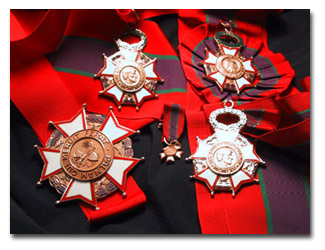
Insignia of the Lincoln Academy of Illinois

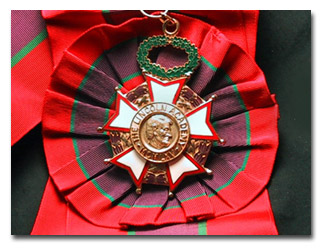
Sash worn by the Officers, Regents and General Trustees

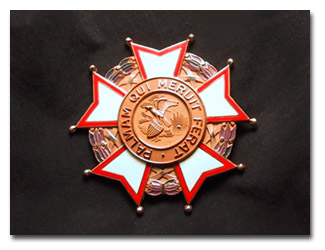
Badge worn by the Regents

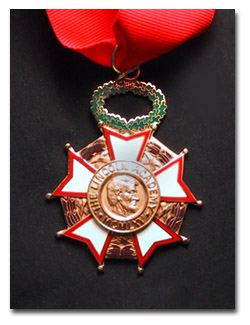
Student Laureate Medallion

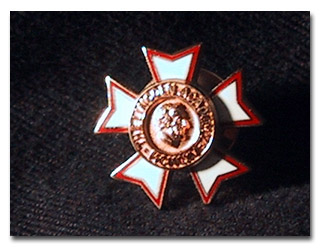
Lapel pin

FREQUENTLY ASKED QUESTIONS
What is The Lincoln Academy of Illinois?
The Lincoln Academy of Illinois is a not-for-profit, nonpartisan, and self-perpetuating corporation established in 1964 to recognize the outstanding contributions made by living Illinois citizens, whether by birth or by residence, toward the social, cultural, and technological progress of mankind and thereby to encourage greater dedication to such progress by all citizens of Illinois.
How does the Academy recognize 'outstanding contributions'?
Individuals whose achievements are considered deserving of tribute by the Academy are elected Members of the Academy, proclaimed Laureates, and decorated with the Order of Lincoln, the State of Illinois’ highest award, at a formal public ceremony each year.
What is the Order of Lincoln?
The Order of Lincoln, the State’s highest award for individual achievement, consists of conferring upon the Laureate the Badge of the Academy with a citation outlining the reasons for his or her selection as a Laureate.
How are Laureates selected?
Nominations of outstanding Illinoisans, whether by birth or by residence, are called for and received by the Executive Director from the Officers, Regents for Life, Regents, General Trustees and Rectors from the categories of endeavor from which the Academy selects its Laureates. There are presently ten categories: Agriculture, The Arts and Performing Arts, Business, Industry and Communications, Education, Government and Law, Labor, Medicine and Science, Religion, Social Services and Sports. Nominations come through a voting Lincoln Academy member, and all nominations are screened by the Laureate Screening and Qualifying Committee.
How are Laureates elected?
A called meeting of the Regents and General Trustees, a group of no more than sixty distinguished Illinoisans appointed by the Governor to six-year terms, Regents for Life, and Rectors in attendance, vote to select from the nominees submitted, those most deserving to honor as Laureates of the Academy, thereby conferring upon them the Order of Lincoln.
Do elected Laureates have to be in attendance to receive the award?
Yes. It is the policy of the Academy that the newly elected Laureate must be in attendance to receive the award.
Who are the Members of The Lincoln Academy?
The basic membership of the Academy consists of six categories: the Regents, Regents for Life, General Trustees, Rectors, Academic Trustees and Laureates.
What do they do?
The General Trustees, whose duties are to nominate and elect the Laureates, are also responsible for electing from their own ranks the working board of directors of the Academy known as the Board of Regents. Regents for Life are all former living Illinois Governors who serve on the Board of Regents. The Rectors nominate potential Laureates from their respective fields of endeavor. The Academic Trustees nominate outstanding students from their respective universities or colleges to The Abraham Lincoln Civic Engagement Scholarship program. The Rectors, Academic Trustees and Laureates are members ex officio.
What is the responsibility of the Board of Regents?
The Regents elect the officers of the Academy, who serve four-year terms: the principal executive officer, known as the Chancellor, the Vice-Chancellor, the Secretary, the Treasurer and the Executive Director. The incumbent Governor of Illinois always serves as President of the Academy. He or she serves as General Trustee and as a Regent. The Regents set Academy policies to be implemented by the Chancellor who is the principal executive officer and shall, in general, supervise and manage the business and affairs of the Academy.
What is the purpose of the dinner?
Abraham Lincoln enjoyed balls and parties. He cosponsored a cotillion in Springfield, met his wife at a dance, and his second inaugural ball was described as a “very handsome affair.” The point, however, is that Lincoln never knew in his lifetime the appreciation of his fellow citizens for the qualities that after his death have been so greatly admired. The Investiture of Laureates at the annual convocation is quite solemn. The idea of a gala social event also paying tribute to the Laureates for their contributions to mankind is merely an additional way to honoring them during their lifetimes, as parties have traditionally been held at inaugurations and other happy events.
The Lincoln Academy of Illinois, as a non profit organization, relies on revenues from the annual spring convocation for its funding.
Besides a formal Convocation and dinner, what else does The Lincoln Academy do?
The Academy sponsors the annual Student Laureate Award Program that honors senior college students for their overall excellence in curricular and extracurricular activities. There are presently fifty-three colleges and universities participating in the program.
How does the Academy support these programs?
The expenses of the convocation and dinner celebration are borne principally by admission fees charged those who attend. The additional proceeds from the convocation and dinner benefit the Student Laureate Award Program. Operating expenses are supported by donations and assessments from some categories of members and by various individuals and corporations who concur with the goals of the Academy.
